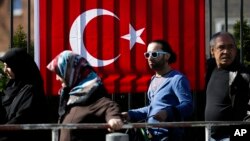Germany will not tolerate foreign espionage on its territory, the interior minister said on Tuesday, in a robust response to media reports that Turkish secret services were spying on supporters of the Gulen movement in Germany.
Fethullah Gulen, a U.S-based Muslim cleric with a large following in Turkey, is accused by Ankara of orchestrating a failed military coup last July. Ankara has purged state institutions, schools and universities and the media of tens of thousands of suspected supporters of the cleric.
The media reports of Turkish espionage in Germany have deepened a rift between the NATO allies in the run-up to a referendum next month in Turkey that proposes to significantly expand the powers of President Tayyip Erdogan.
The Sueddeutsche Zeitung newspaper and two broadcasters reported that Turkey's National Intelligence Agency had given Germany's foreign intelligence service a list of names of hundreds of supposed Gulen supporters living in Germany.
Interior Minister Thomas de Maiziere, speaking in Passau in southern Germany, said he was not surprised by the report and added that the lists would be looked at individually.
"We have told Turkey several times that such [activity] is not acceptable," he said. "Regardless of what you think of the Gulen movement, German law applies here and citizens who live here won't be spied on by foreign states," he said.
The reports said the list included the names of more than 300 people and more than 200 associations, schools and other institutions and a German investigation indicated some of the photos may have been taken secretly.
Warning
The northern state of Lower Saxony even said it was warning suspected Gulen movement supporters about possible reprisals if they traveled to their homeland.
"I think that is a justified and necessary measure to be able to warn people," said state interior minister Boris Pistorius. "The intensity and ruthlessness being [used] on people living on foreign soil is remarkable."
Concerns about Turkish spying are not confined to Germany.
Swedish public service radio broadcaster SR reported that Turkey's ruling AK Party was putting pressure, via the Union of European Turkish Democrats, on Swedish Gulen supporters to supply information about fellow Gulen supporters in the country.
Germany is already investigating possible spying by Turkish imams in Germany. A spokesman for the chief federal prosecutor's office said that probe continued.
German politicians, including Chancellor Angela Merkel, are angry about Erdogan's repeated comparisons of their country to Nazi Germany in response to cancellations of planned campaign events targeting the Turkish diaspora in Germany. Germany says the cancellations were prompted by security concerns.
The speaker of the Bundestag lower house of parliament said in a speech late on Monday that Turkey was turning into an authoritarian system and that its president was effectively staging a coup against his own country.
Norbert Lammert, a member of Merkel's conservatives, said the referendum was about "transforming an undoubtedly fragile but democratic system into an authoritarian system — and this second coup attempt may well be successful".





